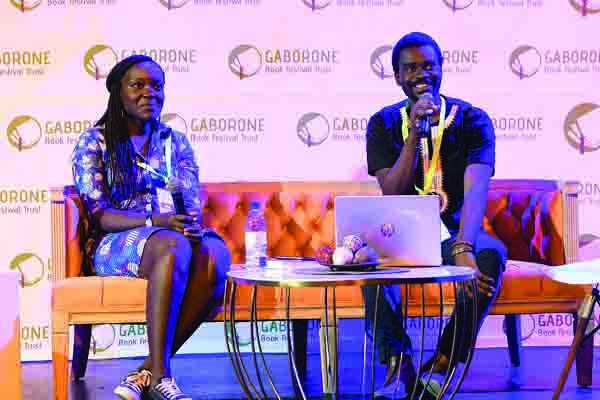Gaborone Book Festival attracts diverse writers
Botswana is rich with creative talent that should be tapped into and harnessed. This was said by Assistant Minister of Youth Empowerment, Sport and Culture Development, Phillip Makgalemele during the opening of the second annual Gaborone Book Festival (GBF) at Maitisong recently.
Makgalemele, who has authored two books, Hour for Cooperatives in 1998 and Game Plan in 2018 – said Batswana are known to be a people who do not read but noted that it was imperative to share the word that reading is essential not only for educational purposes but also for leisure. He further said literature is an important component of our culture, adding that Botswana society is cemented on values of retaining and embracing unique identity. “Literature is an important component of our culture and GBF is playing an important role of offering a platform for celebrating and highlighting literary works of Botswana writers,” he said.
Donald Molosi read extracts from his book, Dear Upright African. He shared in part of how he had personally experienced situations where he was considered not white enough and not black enough, which he said was an “insult to even my ancestors.” He noted that it was disappointing how the African classroom is not only made to look as British as possible, but also that Africans are expected to live up to the British narrative, neglecting their authentic heritage, history and values in the process.
Nanjala Nyabola, an independent researcher and political analyst whose work focuses on conflict and post conflict transitions, with a focus on refugees and migration, as well as East African politics and feminism appeared to be a firm favourite and had everyone on the edge of their seat through her commentary. Nyabola is the author of “Digital Democracy, Analogue Politics: How the Internet Era is Transforming Kenya” and co-editor of “Where Women Are: Gender and the 2017 Kenyan Elections”. TJ Dema, who recently published her first long-form book, Careless Seamstress took the audience through the topics that inspired the collection of poetry.
Other authors who graced the event included Rachel Nekati who writes on health and fitness, Nelson Letshwene who writes on finances, Enole Ditsheko, author of Wrestling Botswana from the Khamas, Phehello Mofokeng publishing partner to Sol Plaatje University’s Repatriation of Letters project; which aims to reclaim back into Setswana, English texts that are written by Batswana and is also the author of Sankomota: An Ode in One Album – A Reflective Essay. Siya Khumalo gave commentary on religion, politics and sex through the perspective of his debut book, You Have To Be Gay To Know God. Rosie Motene who has been active for over a decade in generating awareness on women and children abuse across the African continent and has also found time to write the story of her life – Reclaiming The Soil, as well as Onica Lekuntwane who writes children’s books, entertaintment journalist Lerato Mogoatlhe who has written a travel book and Brilliant Kodie, among others.
Co-founder of GBF Kenanao Phele said they were pleased with the growth of the festival. “Most impressive was the Student zone sponsored by IDM. We saw the numbers increase from 100 learners last year to 200 this year. UNESCO has declared 2019 year of indigenous languages so we zoned in on issues of heritage, identity and language. We also had a Master class of writing in indigenous writing with Dr. Naledi Kgolo. The participants were happy and have asked for another workshop, especially as it forms part of preservation of culture,” she said. She also said that the launch of the Botswana Women Writers anthology on the first day of the festival was also a success.
“We are proud to have been part of this event that celebrates the work of women writers in Botswana. We always want to give prominence to important books coming from Botswana regardless of genre. The content at the festival was rich and well-articulated,” she said. Phele also said that they were impressed by the number of people who were buying books. Their partners, Sebilo Books was the main book seller. She added that they still appealed for sponsorship adding that the festival did not only inculcate a culture of reading and writing but also gave local authors an important platform and attracted a diverse crowd to share ideas and engage.




